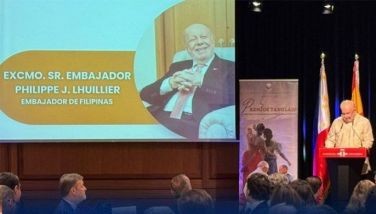Before you click ‘post’

Before clicking “post” in your online social network accounts, think carefully. Who do you want to share this post with? Do you have privacy rights as regards this post? Many online social network users post photos, opinions and all kinds of information about themselves, believing that their posts will only be shared with their social network “friends” or “followers;” and if those posts have somehow reached others whom they have not granted permission to view it, they feel aggrieved and claim that their privacy rights have been violated. But are their privacy rights violated?
The 1987 Philippine Constitution tells us that we have a right to privacy. Article III in the Bill of Rights provides in Section 2 that “the right of the people to be secure in their persons, houses, papers and effects against unreasonable searches and seizures of whatever nature and for any purpose shall be inviolable xxx.”
Furthermore, Article 3, Section 3(1) provides that the “privacy of communication and correspondence shall be inviolable except upon lawful order of the court, or when public safety or order requires otherwise, as prescribed by law.” These provisions in the Bill of Rights though, are only enforceable against the government and not private persons.
There are also several laws that protect our privacy. Article 26 of the Civil Code provides that “[e]very person shall respect the dignity, personality, privacy and peace of mind of his neighbors and other persons.” The Anti-Wire Tapping Act provides that it is unlawful for any person who is not authorized by all the parties to any private communication to secretly overhear or record such communication. The Secrecy of Bank Deposits Act also provides that save for certain exceptions, our bank deposits are confidential and may not be examined, inquired or looked into by any person.
Although we can generally expect our communications and correspondence to be private, do we have a right to expect our Facebook posts shared only to our Facebook friends to be kept private? If we limit our privacy settings to “Friends” only, can we claim that our privacy rights have been violated if for some reason those who are not our social network “friends” are able to view our posts?
In a number of cases the Supreme Court expressed their views on an individual’s right to privacy in online social networking sites, particularly in Facebook.
In the case of Vivares v. St. Theresa’s College (G.R. No. 202666, [September 29, 2014], 744 PHIL 451-480) the Court, through Justice Presbitero Velasco Jr., said that every individual’s right to control the flow of information about oneself “should be protected and that each individual should have at least a reasonable expectation of privacy in cyberspace,” including online social networks. However, the Court also said that this “does not mean that any Facebook user automatically has a protected expectation of privacy in all of his or her Facebook activities.”
The case of Vivares involved a student at St. Theresa’s College who uploaded, in her Facebook account, photos of herself and some of her schoolmates from the waist up, wearing only their undergarments. One of their schoolmates was able to view these photos and reported this to their teacher, which led to the students in the photos being barred from participating in the commencement exercises. The parents of these students filed a Petition which prayed, among others, that the digital images that were accessed, saved, reproduced and used, be declared illegally obtained in violation of the children’s right to privacy. They argued that because the privacy setting of their children’s Facebook accounts was set at “Friends Only,” that they have a reasonable expectation of privacy which must be respected.
The Court ruled that the school did not violate the children’s right to privacy. Absent any proof that petitioners’ children limited the disclosure of the photos, the Court said that it can be assumed that the photos were visible to either their Facebook friends or to the public at large. Thus, they cannot invoke the protection attached to the right to informational privacy or the right to control information about oneself.
The Court in Vivares quoted the case of US v. Gines-Perez (214 F. Supp. 2d at 225), where it was held that “[a] person who places a photograph on the internet precisely intends to forsake and renounce all privacy rights to such imagery,” and particularly under circumstances where there were no protective measures or devices employed which would have controlled access to the web page or photograph.
The Court stated in Vivares that “setting a post’s or profile detail’s privacy to ‘Friends’ is no assurance that it can no longer be viewed by another user who is not Facebook friends with the source of the content.” Thus the information one shares with his or her Facebook friends on Facebook is still outside the protected zones of privacy.
The Court continued to state that if access to the photos were limited to the “Only Me” privacy setting, or the “Custom” setting that limited access to the photo to a select few, the result may have been different, for in such instances, “the intention to limit access to the particular post, instead of being broadcasted to the public at large or all the user’s friends en masse, becomes more manifest and palpable.”
In the case of Belo-Henares v. Guevarra (A.C. No. 11394, Dec. 1, 2016), the respondent claimed that his right to privacy was violated when his Facebook posts with limited settings, containing insulting remarks against the complainant, were viewed by the complainant. The Court quoted Vivares in opining that restricting the accessibility of one’s Facebook posts to “Friends” does guarantee that it can be viewed by one’s Facebook friends only and thus, the respondent cannot claim that there was a violation of his right to privacy when the complainant, who was not his Facebook friend, was able to view these Facebook posts.
So before clicking “post,” think carefully and be aware of the risks. Bear in mind that many commentators on privacy share the opinion that “[i]n this [social networking] environment, privacy is no longer grounded in reasonable expectations, but rather in some theoretical protocol better known as wishful thinking” (Romano v. Steelcase, Inc., Supreme Court of New York, 30 Misc. 3d 426 quoted in Vivares v. St. Theresa’s College, supra).
- Latest
- Trending




























